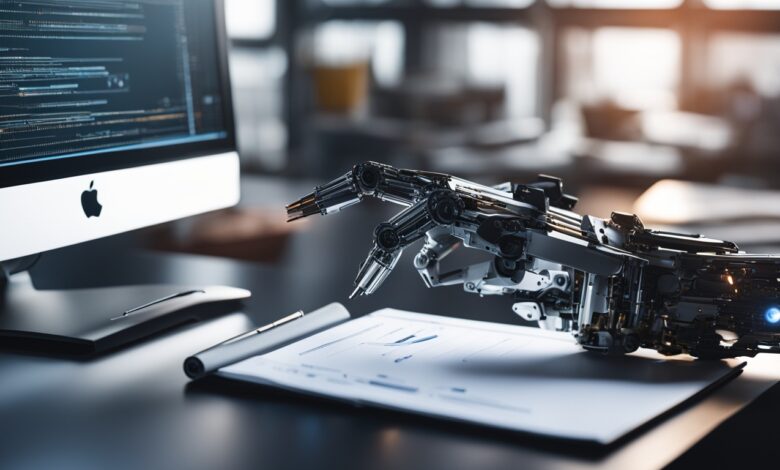Emerging Trends in AI’s Impact on Employment

Artificial Intelligence (AI) transforms industries, reshaping how work gets done. AI’s influence spans sectors like healthcare, finance, and education. AI adoption grows at a compound annual growth rate of 37.3% from 2023 to 2030. Understanding AI’s impact on employment becomes crucial. AI could potentially replace around 800 million jobs worldwide by 2030. However, AI also creates opportunities in fields like data science and machine learning engineering. AI’s role in the job market highlights emerging trends that redefine work and skill requirements.
Emerging Trends in the Broad Impact of AI on Industries
Transformation Across Sectors
Manufacturing and Automation
AI transforms manufacturing by reshaping operations and enhancing product quality. Companies like Siemens, General Electric, and Toyota use AI to optimize production processes. AI enables smart production and efficient supply chain management. Manufacturers adopt AI for decision-making in business models. The implementation of AI fosters sustainable practices in the industry. AI adoption grows in China’s manufacturing sector, indicating a global trend.
Healthcare and AI Integration
AI revolutionizes healthcare by improving patient engagement and reducing diagnostic times. AI enhances operational efficiencies in records management. The healthcare sector experiences a growing AI market. AI supports doctors in making accurate diagnoses and personalized treatment plans. Hospitals use AI for predictive analytics to improve patient outcomes. AI integration in healthcare leads to better resource management and patient satisfaction.
Service Industry Changes
AI in Customer Service
AI transforms customer service by providing 24/7 support and quick responses. Businesses use AI chatbots to handle routine inquiries. AI analyzes customer data to personalize interactions. Companies enhance customer satisfaction through AI-driven insights. AI reduces wait times and improves service efficiency. The service industry benefits from AI’s ability to handle large volumes of requests.
Financial Services and AI
AI reshapes financial services by automating complex tasks and improving risk management. Banks use AI for fraud detection and credit scoring. AI analyzes market trends to inform investment strategies. Financial institutions enhance customer experiences with AI-powered tools. AI streamlines operations and reduces costs in the financial sector. The adoption of AI in finance leads to more secure and efficient services.
Skill Development and Workforce Adaptation

AI’s rapid advancement requires workers to adapt quickly. Many workers feel anxious about job security due to technological changes. A survey reveals that 30% of workers fear job loss from AI. This fear highlights the need for skill development and workforce adaptation. Companies must focus on reskilling employees to stay competitive.
The Need for Upskilling
Upskilling becomes crucial as AI transforms industries. Workers need new skills to thrive in an AI-driven workforce. A survey by Jobs for the Future’s Center shows a majority of respondents recognize this need. Companies must invest in training programs to help employees gain relevant skills.
Digital Literacy and AI
Digital literacy forms the foundation for adapting to AI changes. Workers must understand basic digital tools to work alongside AI systems. Training programs should include digital literacy courses. These courses equip workers with essential skills for the modern workplace.
Lifelong Learning Initiatives
Lifelong learning initiatives ensure continuous skill development. Workers must embrace ongoing education to keep up with AI advancements. Companies can offer workshops and online courses for employees. These initiatives foster a culture of learning and adaptation.
Emerging Job Roles
AI creates new job opportunities across various sectors. Workers must prepare for these emerging roles by acquiring relevant skills. The IBM business survey indicates that 39% of respondents plan to focus on reskilling. This focus ensures employees remain valuable assets in the workforce.
AI Specialists and Data Scientists
AI specialists and data scientists become increasingly important. These roles require expertise in AI technologies and data analysis. Workers interested in these fields should pursue specialized training. Companies can support this by offering relevant educational resources.
AI Ethics and Compliance Officers
AI ethics and compliance officers play a vital role in ensuring ethical AI use. These professionals address concerns related to bias and fairness in AI systems. Workers interested in this field should focus on ethics and regulatory knowledge. Training programs can help develop these skills.
Emerging trends in AI’s impact on employment emphasize the need for skill development. Workers must adapt to new technologies to remain competitive. Companies play a crucial role in supporting workforce adaptation through training and education.
Ethical Considerations and Regulatory Challenges
AI technology presents ethical challenges that require careful consideration. Addressing bias and fairness in AI systems stands as a primary concern. Developers must ensure diversity in AI development to prevent biased outcomes. Diverse teams bring varied perspectives that enhance AI’s fairness. Companies must prioritize inclusive practices during AI system design.
Addressing Bias and Fairness
Ensuring Diversity in AI Development
Diversity in AI development helps mitigate bias. Teams with diverse backgrounds can identify potential biases in AI systems. Companies should implement hiring practices that promote diversity. Training programs can educate developers on the importance of inclusivity. Organizations must commit to creating equitable AI solutions.
Mitigating Algorithmic Bias
Algorithmic bias poses significant risks in AI applications. Developers should test AI systems for bias before deployment. Regular audits can help identify and correct biased algorithms. Companies must use transparent processes to address algorithmic bias. The AI Bill of Rights Blueprint provides guidance on protecting against algorithmic discrimination.
Regulatory Frameworks
Regulatory frameworks play a crucial role in governing AI use. Global standards and policies aim to create a unified approach to AI regulation. The White House Executive Order on AI emphasizes federal standards development. These standards guide the safe and responsible use of AI technologies.
Global Standards and Policies
Global standards ensure consistency in AI regulation across jurisdictions. The AI Regulatory Approaches Comparison highlights differences between the UK’s principles-based framework and the EU’s comprehensive legal framework. Countries must collaborate to establish effective global AI policies. International cooperation can lead to more robust regulatory measures.
Industry-Specific Regulations
Industry-specific regulations address unique challenges within sectors. Financial services, healthcare, and manufacturing require tailored AI guidelines. The Global Development of AI Policies and Regulation document assesses AI risks in various industries. Sector-specific regulations ensure AI systems operate ethically and responsibly.
AI transforms employment by automating tasks and creating new opportunities. The job market faces challenges and opportunities due to AI’s influence. Workers must adapt to AI-driven changes. Companies should invest in skill development to stay competitive. AI governance requires flexible frameworks to address ethical concerns. Proactive adaptation ensures AI benefits all stakeholders. Embrace AI’s potential to shape a future where humans and machines coexist.



